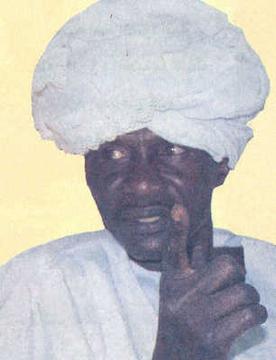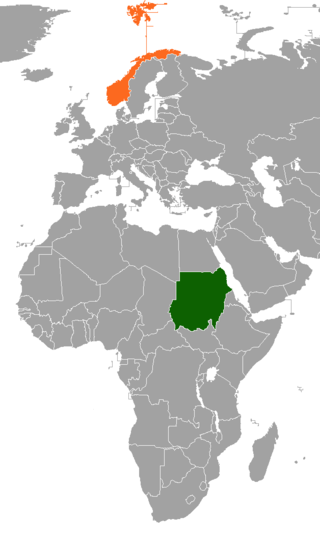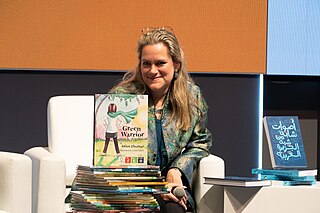
Darfur is a region of western Sudan. Dār is an Arabic word meaning "home [of]" – the region was named Dardaju while ruled by the Daju, who migrated from Meroë c. 350 AD, and it was renamed Dartunjur when the Tunjur ruled the area. Darfur was an independent sultanate for several hundred years until 1874, when it fell to the Sudanese warlord Rabih az-Zubayr. The region was later invaded and incorporated into Sudan by Anglo-Egyptian forces in 1916. As an administrative region, Darfur is divided into five federal states: Central Darfur, East Darfur, North Darfur, South Darfur and West Darfur. Because of the War in Darfur between Sudanese government forces and the indigenous population, the region has been in a state of humanitarian emergency and genocide since 2003. The factors include religious and ethnic rivalry, and the rivalry between farmers and herders.

Paul R. Williams is a professor at American University, where he teaches in the School of International Service and the Washington College of Law, holding the Rebecca Grazier Professorship in Law and International Relations. He is the president and co-founder of the Public International Law & Policy Group (PILPG), a Non-Governmental Organization (NGO) which provides pro bono assistance to countries and governments involved in peace negotiations, drafting post-conflict constitutions, and prosecuting war criminals, and was consultant at the London based Bosnian Institute for years.

United Nations Security Council Resolution 1564, adopted on 18 September 2004, after recalling resolutions 1502 (2003), 1547 (2004) and 1556 (2004), the Council threatened the imposition of sanctions against Sudan if it failed to comply with its obligations on Darfur, and an international inquiry was established to investigate violations of human rights in the region.

The War in Darfur, also nicknamed the Land Cruiser War, was a major armed conflict in the Darfur region of Sudan that began in February 2003 when the Sudan Liberation Movement (SLM) and the Justice and Equality Movement (JEM) rebel groups began fighting against the government of Sudan, which they accused of oppressing Darfur's non-Arab population. The government responded to attacks by carrying out a campaign of ethnic cleansing against Darfur's non-Arabs. This resulted in the death of hundreds of thousands of civilians and the indictment of Sudan's president, Omar al-Bashir, for genocide, war crimes, and crimes against humanity by the International Criminal Court.

This is the bibliography and reference section for the Darfur conflict series. External links to reports, news articles and other sources of information may also be found below.

While there is a consensus in the international community that ethnic groups have been targeted in Darfur and that crimes against humanity have therefore occurred, there has been debate in some quarters about whether genocide has taken place there. In May 2006, the International Commission of Inquiry on Darfur organized by United Nations "concluded that the Government of the Sudan has not pursued a policy of genocide ... [though] international offences such as the crimes against humanity and war crimes that have been committed in Darfur may be more serious and heinous than genocide." Eric Reeves, a researcher and frequent commentator on Darfur, has questioned the methodology of the commission's report.
Alexander William Lowndes de Waal, a British researcher on African elite politics, is the executive director of the World Peace Foundation at the Fletcher School of Law and Diplomacy at Tufts University. Previously, he was a fellow of the Harvard Humanitarian Initiative at Harvard University, as well as program director at the Social Science Research Council on AIDS in New York City.

United Nations Security Council Resolution 1593, adopted on 31 March 2005, after receiving a report by the International Commission of Inquiry on Darfur, the Council referred the situation in the Darfur region of Sudan to the International Criminal Court (ICC) and required Sudan to co-operate fully. It marked the first time the council had referred a situation to the court, and also compelled a country to co-operate with it.

Ali Muhammad Ali Abd-Al-Rahman, commonly known as Ali Kushayb, is a senior Janjaweed commander who supported the Sudanese government against Darfur rebel groups during the Omar al-Bashir presidency. He was indicted by the International Criminal Court (ICC) for war crimes. He was known as aqid al oqada and was active in Wadi Salih, West Darfur.

Norway – Sudan relations are international relations between Norway and Sudan.
The Philip Leverhulme Prize is awarded by the Leverhulme Trust to recognise the achievement of outstanding researchers whose work has already attracted international recognition and whose future career is exceptionally promising. The prize scheme makes up to thirty awards of £100,000 a year, across a range of academic disciplines.
Chandra Lekha Sriram (1971–2018) was Professor of Law at the University of London, School of Oriental and African Studies (SOAS). She has written and lectured widely on conflict prevention, post-conflict peacebuilding, human rights, international criminal law, and transitional justice. Her most recent monograph, Peace as governance: Power-sharing, armed groups, and contemporary peace negotiations (2008), offered a comparative critical examination of the use of power-sharing incentives in peace processes in Colombia, Sri Lanka, and Sudan. Previous monographs on transitional justice and international criminal accountability, Confronting past human rights violations: Justice versus peace in times of transition (2004) and Globalizing Justice for mass atrocities: A revolution in accountability (2005); examined transitional justice and internationalized and externalized criminal justice processes in or for Sierra Leone, Timor-Leste, El Salvador, Honduras, Sri Lanka, South Africa, and Argentina.
The European Journal of International Law is a quarterly law journal covering international law in a combination of theoretical and practical approaches. It also provides coverage of the relationship between international law and European Union law. The journal was established in 1990 by a group of scholars based at the European University Institute, universities in Florence and Munich, Panthéon-Assas University, and the Michigan Law School.

The International Criminal Court investigation in Darfur or the situation in Darfur is an ongoing investigation by the International Criminal Court (ICC) into criminal acts committed during the War in Darfur. Although Sudan is not a state party to the Rome Statute, the treaty which created the ICC, the situation in Darfur was referred to the ICC's Prosecutor by the United Nations Security Council in 2005. As of June 2019, five suspects remained under indictment by the court: Ahmed Haroun, Ali Kushayb, Omar al-Bashir, Abdallah Banda and Abdel Rahim Mohammed Hussein. Charges against Bahar Abu Garda were dropped on the basis of insufficient evidence in 2010 and those against Saleh Jerbo were dropped following his death in 2013. In mid-April 2019, Haroun, al-Bashir and Hussein were imprisoned in Sudan as a result of the 2019 Sudanese coup d'état. In early November 2019, the Forces of Freedom and Change (FFC) and Sudanese Prime Minister Abdalla Hamdok stated that al-Bashir would be transferred to the ICC. One of the demands of the displaced people of Darfur visited by Hamdok prior to Hamdok's statement was that "Omar Al Bashir and the other wanted persons" had to be surrendered to the ICC.

The Darfur genocide was the systematic killing of ethnic Darfuri people during the War in Darfur. The genocide, which was carried out against the Fur, Masalit and Zaghawa ethnic groups, led the International Criminal Court (ICC) to indict several people for crimes against humanity, rape, forced transfer and torture. An estimated 200,000 people were killed between 2003 and 2005.

Marie-Claire Cordonier Segger is a full professor, senior executive, an international expert in policy, law and governance on climate change, biodiversity, human rights, trade, investment and financial law and the world's Sustainable Development Goals. She currently serves as Leverhulme Trust Visiting Professor at the University of Cambridge, UK; executive secretary of the global Climate Law and Governance Initiative (CLGI) and senior director of the Centre for International Sustainable Development Law (CISDL). She is also a Fellow in Law & LLM/MCL Director of Studies at the Lucy Cavendish College; fellow at the Lauterpacht Centre for International Law; visiting fellow at the Bennett Institute for Public Policy and Fellow at the Cambridge Centre for Energy, Environment & Natural Resource Governance. Further, she is full professor at the University of Waterloo School of Environment, Enterprise and Development in Waterloo, Ontario, Canada, where she is also senior fellow at the Balsillie School of International Affairs (BSIA) and senior advisor to the Interdisciplinary Centre on Climate Change (IC3). She serves as chair of the Convention on Biological Diversity (CBD) Biodiversity Law & Governance Initiative; rapporteur for the International Law Association Committee on Sustainable Natural Resources Management; co-founder member of the board of the Sustainable Development Solutions Network (SDSN) of Canada; member of the International Law Association (ILA) Board of Canada; co-founder and councillor of the World Future Council.

A series of political agreements among Sudanese political and military forces for a democratic transition in Sudan began in July 2019. Omar al-Bashir overthrew the democratically elected government of Sadiq al-Mahdi in 1989 and was himself overthrown in the 2019 Sudanese coup d'état, in which he was replaced by the Transitional Military Council (TMC) after months of sustained street protests. Following further protests and the 3 June Khartoum massacre, TMC and the Forces of Freedom and Change (FFC) alliance agreed on 5 July 2019 to a 39-month transition process to return to democracy, including the creation of executive, legislative and judicial institutions and procedures.
The Sudanese peace process consists of meetings, written agreements and actions that aim to resolve the War in Darfur, the Sudanese conflict in South Kordofan and Blue Nile, and armed conflicts in central, northern and eastern Sudan.
Prabha Kotiswaran is a professor of law and social justice working at King's College London (KCL) in the United Kingdom.
Adeeb Abdel Rahman Youssef is a Sudanese human rights activist and former politician. From 2003 he documented evidence of atrocities in his native Darfur. For his activism he was imprisoned and tortured by Sudanese authorities. At one point he moved to the United States where he remained for several years and studied at George Mason University. After the Sudanese revolution he served as governor of Central Darfur from 27 July 2020 until his removal during the 2021 Sudanese coup d'état on 25 October 2021.












